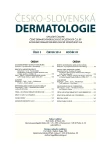-
Medical journals
- Career
Analysis of Biological Therapy of Psoriasis in Faculty Hospital Hradec Králové in 2006–2011
Authors: J. Ettler 1,2; K. Ettler 1
Authors‘ workplace: Klinika nemocí kožních a pohlavních FN a LF UK Hradec Králové přednosta doc. MUDr. Karel Ettler, CSc. 1; Dermatovenerologická klinika 2. LF UK a FN Královské Vinohrady, Praha přednosta prof. MUDr. Petr Arenberger, DrSc., MBA 2
Published in: Čes-slov Derm, 89, 2014, No. 3, p. 128-132
Category: Clinical and laboratory Research
Overview
Biological therapy of psoriasis is modern, expensive and highly effective therapeutical modality for this chronic disease. Currently, there are 4 biologics registered for the treatment of severe psoriasis in the Czech Republic: etanercept, adalimumab, infliximab and ustekinumab. Retrospective analysis performed in the Faculty Hospital Hradec Králové in the period 2006–2011 did not show statistically significant difference of efficacy among biologics used after the first three months of therapy. The main reason for therapy discontinuation was loss of efficacy (57,3 %). No complications and side effects were recorded in 54,8 % of patients.
Key words:
biological therapy of psoriasis – efficacy – side effects
Sources
1. ARENBERGER, P. Místo a možnosti biologické léčby v dermatologii. Acta Medicinae, 2013, 1, p. 9–12.
2. BRUNASSO, A. M., PUNTONI, M., SALVINI, C., DELFINO, C. et al. Tolerability and safety of biological therapies for psoriasis in daily clinical practice: a study of 103 Italian patients. Acta Derm Venereol, 2011, 91, 1, p. 44–49.
3. CETKOVSKÁ, P., KOJANOVÁ, M. Česká doporučení k biologické léčbě závažné chronické ložiskové psoriázy. Čes.-slov. Derm., 2012, 87, 1, s. I–XXII.
4. COZZANI, E., BURLANDO, M., PARODI, A. Detection of antibodies to anti-TNF agents in psoriatic patients: a preliminary study. G. Ital. Dermatol. Venereol., 2013, 148, 2, p. 171–174.
5. GELFAND, J. M., YEUNG, H. Metabolic syndrome in patients with psoriatic disease. J. Rheumatol. Suppl., 2012, 89, p. 24–28.
6. GNIADECKI, R., KRAGBALLE, K., DAM, TN., SKOV, L. Comparison of drug survival rates for adalimumab, etanercept and infliximab in patients with psoriasis vulgaris. Br. J. Dermatol., 2011, 164, 5, p. 1091–1096.
7. KAMINSKA, E., PATEL, I. et al. Comparing the lifetime risks of TNF-alpha inhibitor use to common benchmarks of risk. J. Dermatol. Treatment, 2013, 24, p. 101–106.
8. KIM, I. H., WEST, C. E., KWATRA, S. G., FELDMAN, S. R. et al. Comparative efficacy of biologics in psoriasis: a review. Am. J. Clin. Dermatol., 2012, 13, p. 365–374.
9. LAWS, P. M., DOWNS, A. M., PARSLEW, R., DEVER, B. et al. Practical experience of ustekinumab in the treatment of psoriasis: experience from a multicentre, retrospective case cohort study across the U.K. and Ireland. Br. J. Dermatol., 2012, 166, 1, p. 189–195.
10. LEMAN, J., BURDEN, A. D. Sequential use of biologics in the treatment of moderate-to-severe plaque psoriasis. Br. J. Dermatol., 2012, 167, Suppl 3, p. 12–20.
11. LIU, Y., WU, E. Q., BENSIMON, A. G., FAN, C. P., BAO, Y. et al. Cost per responder associated with biologic therapies for Crohn’s disease, psoriasis, and rheumatoid arthritis. Adv. Ther., 2012, 29, 7, p. 620–623.
12. PAPP, K. A., DEKOVEN, J., PARSONS, L., PIRZADA, S. et al. Biologic therapy in psoriasis: perspectives on associated risks and patient management. J. Cutan Med. Surg., 2012, 16, 3, p. 153–168.
13. PUIG, L. Treatment of severe psoriasis. J. Eur. Acad. Dermatol. Venereol., 2012, 26, Suppl 5, p. 17–18.
14. RUSTIN, M. H. Long-term safety of biologics in the treatment of moderate-to-severe plaque psoriasis: review of current data. Br. J. Dermatol., 2012, 167, Suppl 3, p. 3–11.
15. SANTORO, F. A., ROTHE, M. J., STROBER, B. E. Ethical considerations when prescribing biologics in dermatology. Clin. Dermatol., 2012, 30, 5, p. 492–495.
16. SIVAMANI, R. K., GOODARZI, H., GARCIA, M. S., RAYCHAUDHURI, S. P. et al. Biologic therapies in the treatment of psoriasis: a comprehensive evidence-based basic science and clinical review and a practical guide to tuberculosis monitoring. Clin. Rev. Allergy Immunol., 2013, 44, 2, p. 121–140.
17. STERRY, W., VAN DE KERKHOF, P. Is ‘class effect’ relevant when assessing the benefit/risk profile of a biologic agent? J. Eur. Acad. Dermatol. Venereol., 2012, 26, Suppl 5, p. 9–16.
18. VAN LÜMIG, P. P., VAN DE KERKHOF, P. C., BOEZEMAN, J. B. et al. Adalimumab therapy for psoriasis in real-world practice: efficacy, safety and results in biologic-naïve vs. non-naïve patients. J. Eur. Acad. Dermatol. Venereol., 2013, 27, 5, p. 593–600.
19. ZHU, X., ZHENG, M., SONG, M., SHEN, Y. K. et al. Efficacy and safety of ustekinumab in Chinese patients with moderate to severe plaque-type psoriasis: results from a phase 3 clinical trial (LOTUS). J. Drugs Dermatol., 2013, 12, 2, p. 166–174.
Labels
Dermatology & STDs Paediatric dermatology & STDs
Article was published inCzech-Slovak Dermatology

2014 Issue 3
Most read in this issue- Psychopharmaceuticals in Dermatology
- Evolution of Contact Sensitivity to The European Standard Series Allergens in the Czech Republic
- Folliculotropic T-cell Lymphoma – Case Report
- Analysis of Biological Therapy of Psoriasis in Faculty Hospital Hradec Králové in 2006–2011
Login#ADS_BOTTOM_SCRIPTS#Forgotten passwordEnter the email address that you registered with. We will send you instructions on how to set a new password.
- Career

